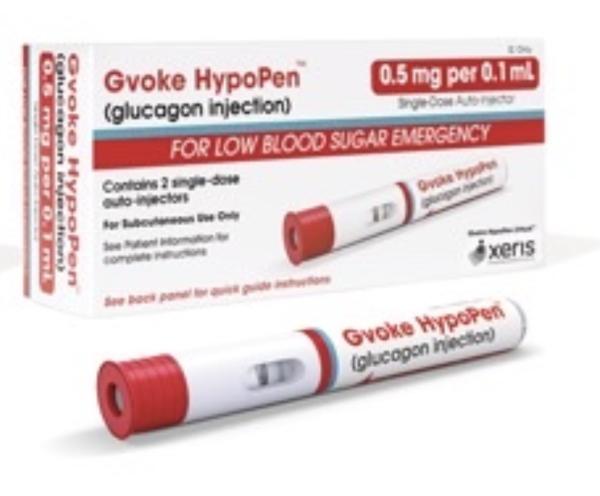Generic Gvoke Availability
Last updated on Aug 6, 2025.
See also: Generic Gvoke VialDx
Gvoke is a brand name of glucagon, approved by the FDA in the following formulation(s):
GVOKE HYPOPEN (glucagon - solution;subcutaneous)
-
Manufacturer: XERIS
Approval date: September 10, 2019
Strength(s): 0.5MG/0.1ML (0.5MG/0.1ML) [RLD], 1MG/0.2ML (1MG/0.2ML) [RLD] -
Manufacturer: XERIS
Approval date: August 20, 2021
Strength(s): 1MG/0.2ML (1MG/0.2ML) [RLD] -
Manufacturer: XERIS
Approval date: September 10, 2019
Strength(s): 0.5MG/0.1ML (0.5MG/0.1ML) (discontinued) [RLD], 1MG/0.2ML (1MG/0.2ML) [RLD]
Is there a generic version of Gvoke available?
No. There is currently no therapeutically equivalent version of Gvoke available in the United States.
Note: Fraudulent online pharmacies may attempt to sell an illegal generic version of Gvoke. These medications may be counterfeit and potentially unsafe. If you purchase medications online, be sure you are buying from a reputable and valid online pharmacy. Ask your health care provider for advice if you are unsure about the online purchase of any medication.
See also: Generic Drug FAQ.
Related patents
Patents are granted by the U.S. Patent and Trademark Office at any time during a drug's development and may include a wide range of claims.
-
Methods for producing stable therapeutic glucagon formulations in aprotic polar solvents
Patent 11,590,205
Issued: February 28, 2023
Inventor(s): Prestrelski; Steven et al.
Assignee(s): Xeris Pharmaceuticals, Inc. (Chicago, IL)Certain embodiments are directed to a formulation of a therapeutic agent, as well as a method of making such a formulation, comprising at least one therapeutic agent dissolved in an aprotic polar solvent system comprising at least one ionization stabilizing excipient in a concentration sufficient to impart physical and chemical stability to the therapeutic agent.
Patent expiration dates:
- April 22, 2036✓✓
- April 22, 2036
-
Methods for producing stable therapeutic formulations in aprotic polar solvents
Patent 9,649,364
Issued: May 16, 2017
Inventor(s): Prestrelski Steven & Sandoval Michael & Donovan Martin
Assignee(s): XERIS PHARMACEUTICALS, INC.Certain embodiments are directed to a formulation of a therapeutic agent, as well as a method of making such a formulation, comprising at least one therapeutic agent dissolved in an aprotic polar solvent system comprising at least one ionization stabilizing excipient in a concentration sufficient to impart physical and chemical stability to the therapeutic agent.
Patent expiration dates:
- April 22, 2036✓✓
- April 22, 2036
More about Gvoke (glucagon)
- Check interactions
- Compare alternatives
- Pricing & coupons
- Reviews (1)
- Drug images
- Latest FDA alerts (1)
- Side effects
- Dosage information
- Patient tips
- During pregnancy
- FDA approval history
- Drug class: glucose elevating agents
- Breastfeeding
Patient resources
Other brands
Professional resources
Other brands
Related treatment guides
Related/similar drugs
Glossary
| Term | Definition |
|---|---|
| Drug Patent | A drug patent is assigned by the U.S. Patent and Trademark Office and assigns exclusive legal right to the patent holder to protect the proprietary chemical formulation. The patent assigns exclusive legal right to the inventor or patent holder, and may include entities such as the drug brand name, trademark, product dosage form, ingredient formulation, or manufacturing process A patent usually expires 20 years from the date of filing, but can be variable based on many factors, including development of new formulations of the original chemical, and patent infringement litigation. |
| Drug Exclusivity | Exclusivity is the sole marketing rights granted by the FDA to a manufacturer upon the approval of a drug and may run simultaneously with a patent. Exclusivity periods can run from 180 days to seven years depending upon the circumstance of the exclusivity grant. |
| RLD | A Reference Listed Drug (RLD) is an approved drug product to which new generic versions are compared to show that they are bioequivalent. A drug company seeking approval to market a generic equivalent must refer to the Reference Listed Drug in its Abbreviated New Drug Application (ANDA). By designating a single reference listed drug as the standard to which all generic versions must be shown to be bioequivalent, FDA hopes to avoid possible significant variations among generic drugs and their brand name counterpart. |
Further information
Always consult your healthcare provider to ensure the information displayed on this page applies to your personal circumstances.

